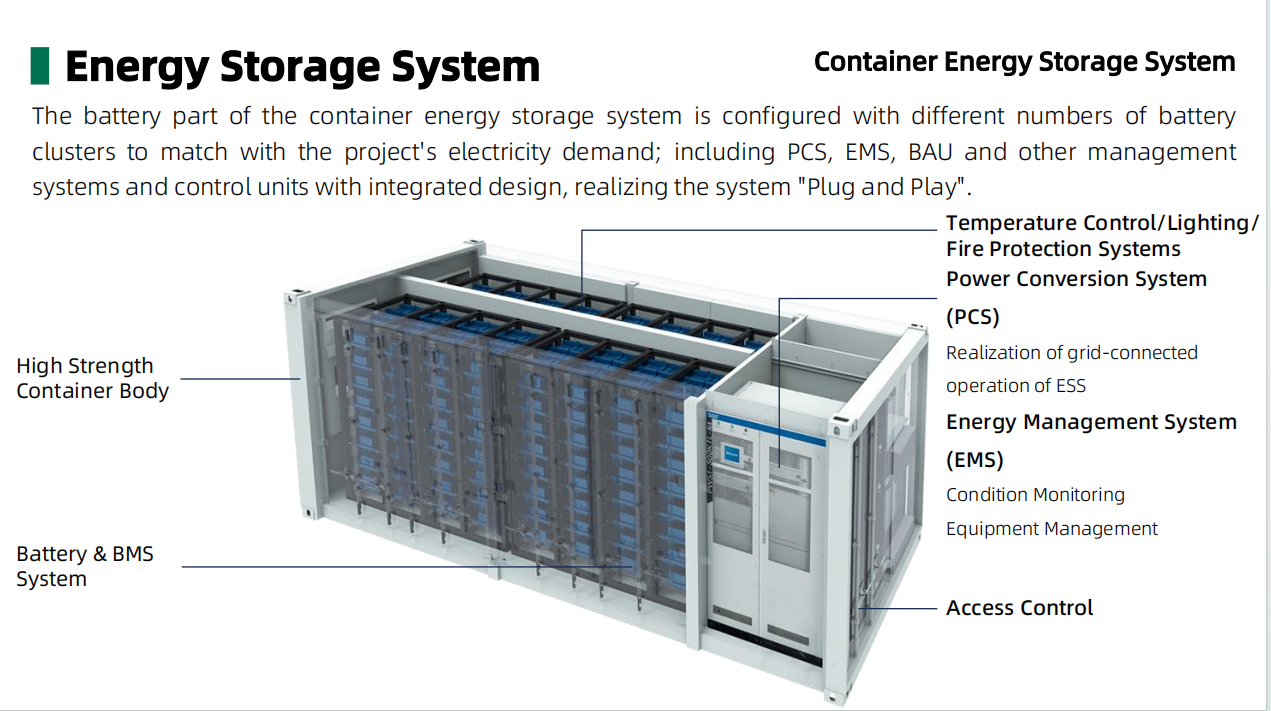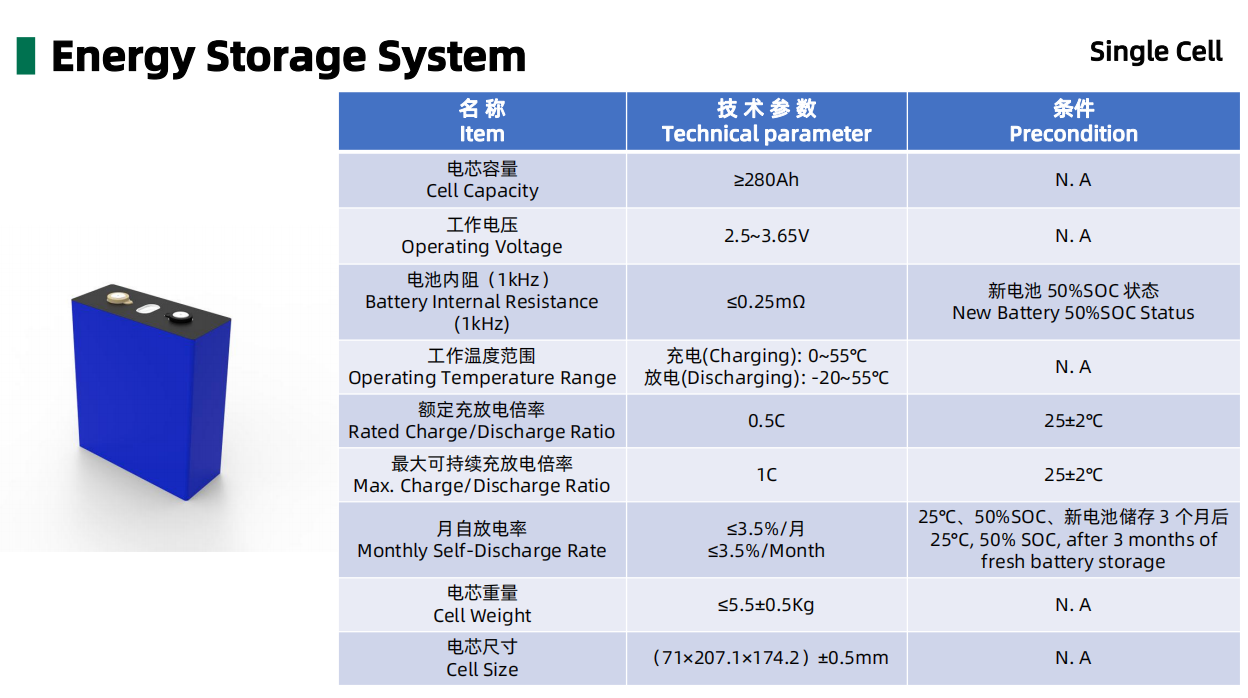When it comes to solar energy storage systems, Green Power provides a range of crucial battery parameters and AC-side parameters. These parameters are essential for ensuring the performance, reliability, and sustainability of the system. In a solar energy storage system, the battery is one of the core components responsible for storing and releasing electrical energy to provide power when needed. Here's more detailed information about these parameters to help you understand their roles and impacts.
Battery Parameters
Cell Type: The performance and characteristics of the battery largely depend on the type of cells used. In solar energy storage systems, common cell types include lithium-ion batteries, sodium-sulfur batteries, and others. Lithium-ion batteries are widely used due to their high energy density and long lifespan, making them suitable for residential and commercial applications.
System Battery Configuration: The number and arrangement of batteries constitute the system's battery configuration. The choice of configuration directly affects the system's total capacity, voltage, and power output. For example, multiple batteries can be connected in parallel to increase capacity or in series to increase voltage.
Battery Rated Capacity: The battery's rated capacity refers to the total amount of electrical energy it can store, typically measured in kilowatt-hours (kWh). This parameter determines the amount of energy the system can deliver, affecting the system's duration of backup power supply.
Battery Voltage Range: Batteries need to operate within a specific voltage range to ensure their safety and effective performance. This range is usually specified in the battery's specifications.
BMS Communication Interface: The Battery Management System (BMS) is a critical component responsible for monitoring and managing the battery's status. Communication interfaces allow the BMS to exchange information with other system components, ensuring the battery's optimal performance and safety.
AC-Side Parameters
AC-Side Rated Power: This parameter represents the maximum AC power the system can provide, typically measured in kilowatts (kW). It determines the maximum load the system can supply, such as the electrical power needs of homes, commercial buildings, or factories.
AC Current Harmonic Distortion: The current harmonic distortion measures the degree of distortion in the AC current waveform. A lower distortion rate typically indicates cleaner and more stable power output from the system.
DC Component: The DC component is the direct current component within the AC current. Reducing the DC component helps reduce incompatibility issues with AC equipment, enhancing system safety and performance.
AC-Side Rated Voltage: This is the nominal value of AC voltage the system can provide, typically measured in volts (V). It must match the local grid standards to ensure connected devices operate correctly.
AC Voltage Range: This parameter indicates the range of AC voltage variations the system can support, ensuring the system functions properly under varying voltage conditions. This is crucial for stable system operation.
Power Factor: The power factor measures the efficiency of electrical energy usage. A high power factor indicates more efficient energy conversion and less energy waste.
Adjustable Reactive Power Range: This parameter determines the range over which the system can adjust reactive power. Reactive power control is essential for maintaining grid stability.
Rated Grid Frequency: The rated grid frequency is the nominal frequency at which the system is designed to operate, typically 50 hertz (Hz) or 60 Hz. The system must be capable of synchronizing with the local grid frequency to ensure proper energy transmission and distribution.
Grid Frequency Range: Grid frequency may vary by region, and this parameter indicates the range of grid frequencies the system can support.
Isolation Method: The isolation method involves the technology or components used to isolate the battery system from the grid. This parameter affects safety and system performance, ensuring secure energy transmission.
Green Power's solar energy storage systems excel in optimizing these parameters. We not only provide high-performance batteries and inverters but also offer customization to meet specific applications and power requirements. Whether it's for residential, commercial, or industrial use, our systems are meticulously designed to provide reliable and efficient solar energy storage solutions.
It's important to note that the performance and benefits of a solar energy storage system are also influenced by system design, installation, and maintenance. Therefore, we recommend partnering with a professional solar energy storage system provider to ensure the system performs optimally throughout its design life.
In addition to the parameters mentioned above, solar energy storage systems can be further customized for specific application needs, such as solar tracking systems, battery energy management systems, and monitoring and telemetry devices. These additional features can further enhance the system's performance and availability.
In summary, solar energy storage systems are a powerful technology that can play a critical role in reducing energy waste, improving electrical supply reliability, and reducing carbon emissions. By gaining a deeper understanding of and optimizing battery parameters and AC-side parameters, Green Power's solar energy storage solutions offer sustainable, efficient, and reliable energy solutions for your energy needs.
Whether you're seeking independent power supply for a home environment or energy backup and storage solutions for commercial or industrial applications, Green Power is your ideal partner. We are committed to providing customers with the best solar energy storage solutions to meet evolving energy needs. If you need more information or consultation, please feel free to contact our professional team. We look forward to providing you with excellent service and technical support to help you achieve a sustainable energy future.
Website:www.fgreenpv.com
Email:Info@fgreenpv.com
WhatsApp:+86 17311228539
Post time: Sep-24-2023













